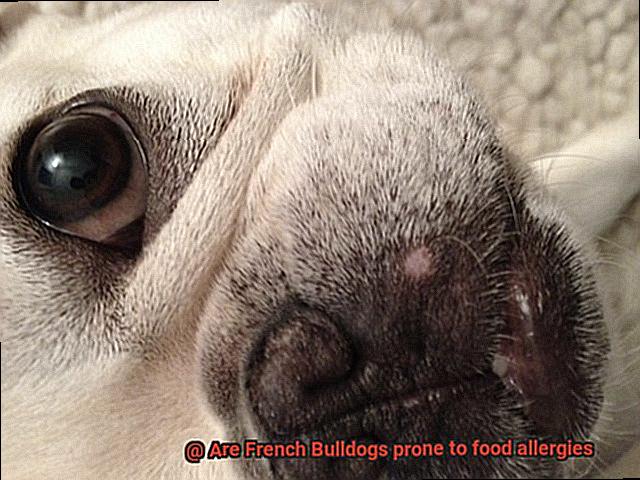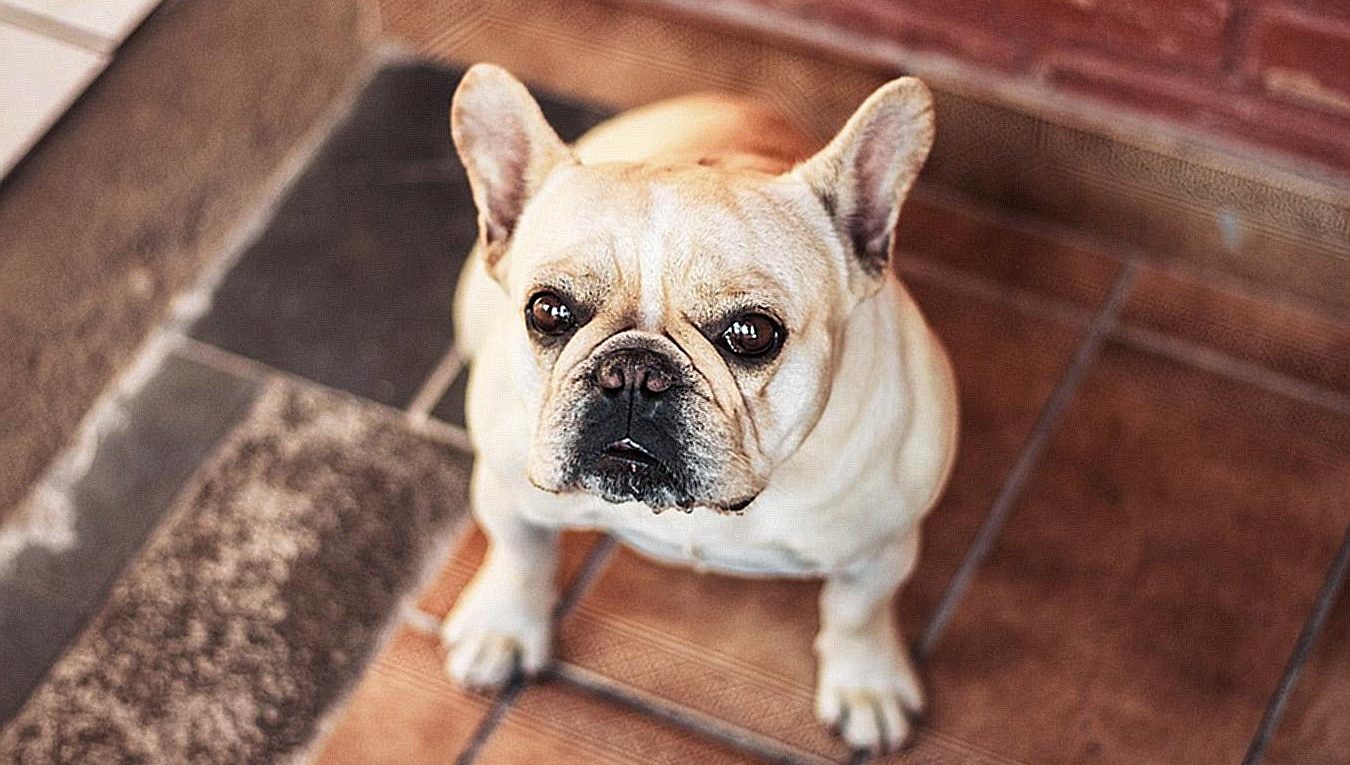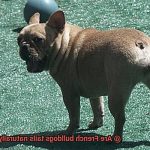Are French Bulldogs prone to food allergies?
French Bulldogs, with their cute faces and charming personalities, have gained popularity as pets. But just like any other breed, they can also experience health problems, including food allergies.
So, whether you suspect your French Bulldog has a food allergy or you’re just curious about the topic, keep reading to learn more.
Are French Bulldogs prone to food allergies
Contents
- 1 Are French Bulldogs prone to food allergies
- 2 What Causes French Bulldogs to be Prone to Food Allergies?
- 3 Common Food Allergens for French Bulldogs
- 4 Symptoms of Food Allergies in French Bulldogs
- 5 Diagnosing a Food Allergy in a French Bulldog
- 6 Treating a French Bulldog with a Food Allergy
- 6.1 Step 1: Spotting the Signs
- 6.2 Step 2: Consult the Experts
- 6.3 Step 3: Conduct an Elimination Diet Trial
- 6.4 Step 4: Reintroduce Ingredients like an Allergy Detective
- 6.5 Step 5: Additional Testing Options
- 6.6 Step 6: Manage by Becoming a Savvy Ingredient Investigator
- 6.7 Step 7: Ongoing Care and Regular Check-ups
- 7 Avoiding Common Triggers of Food Allergies in French Bulldogs
- 8 Working with Veterinarians and Nutritionists for French Bulldog Health
- 9 Taking Proactive Measures to Prevent or Manage Food Allergies in French Bulldogs
- 10 Conclusion
Did you know that French Bulldogs are prone to food allergies? It’s true. In this blog post, we’ll explore why these adorable pups are more susceptible to food allergies and how you can help manage them effectively.
Understanding Food Allergies in French Bulldogs:
Just like humans, French Bulldogs can develop allergic reactions to certain ingredients in their diet. These allergies occur when their immune system overreacts to specific proteins or substances. The most common food allergens for French Bulldogs include chicken, beef, dairy products, wheat, soy, and corn.
Signs and Symptoms:
Identifying food allergies in French Bulldogs can be tricky as the symptoms can vary. Look out for signs such as itching, redness or inflammation of the skin, recurring ear infections, gastrointestinal issues (like diarrhea or vomiting), and excessive licking or chewing of paws. If you notice any of these symptoms, it’s essential to consult with a veterinarian for proper diagnosis and treatment.
Diagnosing Food Allergies:
Diagnosing food allergies in French Bulldogs can be challenging. A veterinarian may suggest an elimination diet or perform allergy testing to identify the specific allergens causing the reaction. An elimination diet involves feeding your Frenchie a novel protein source along with a carbohydrate source for several weeks. If symptoms improve during this time and reappear when the previous diet is reintroduced, it confirms a food allergy.
Managing Food Allergies:
The good news is that food allergies in French Bulldogs can be managed effectively through diet modifications. Once a food allergy is confirmed, the treatment involves avoiding the allergen(s) completely. This may require switching to a specialized hypoallergenic diet or preparing homemade meals for your Frenchie.
Preventing Food Allergies:
Prevention is always better than cure. While not all French Bulldogs will develop food allergies, there are steps you can take to reduce the risk. Start by providing a high-quality, balanced diet from an early age. Choose dog foods that are free from common allergens and artificial additives. Gradually introduce new foods and monitor for any adverse reactions.
What Causes French Bulldogs to be Prone to Food Allergies?
French Bulldogs, with their unique genetic makeup and sensitive digestive system, are more prone to food allergies compared to other dog breeds. Understanding the causes behind their susceptibility can help owners better manage their diet and minimize the risk of allergic reactions.
- Genetic Predisposition: French Bulldogs have a genetic predisposition to allergies, which can be traced back to their ancestors and the limited gene pool they were bred from. This genetic makeup makes them more susceptible to developing allergies, including food allergies.
- Sensitive Digestive System: French Bulldogs have a delicate gastrointestinal tract, making them more prone to developing sensitivities and allergies to certain ingredients in their diet. This sensitivity can lead to adverse reactions such as itching, gastrointestinal upset, and skin irritations when they consume certain foods.
- Common Allergens in Commercial Dog Foods: Many commercial dog foods contain common allergens such as wheat, corn, soy, and artificial additives. These ingredients are known to cause allergic reactions in dogs, and French Bulldogs are particularly sensitive to them. Reading labels and choosing dog foods specifically formulated for dogs with food sensitivities or allergies is crucial.
- Overexposure to Certain Ingredients: Feeding the same type of food over an extended period can increase the likelihood of developing sensitivities or allergies to specific ingredients. It is recommended to vary a French Bulldog’s diet and introduce new protein sources gradually to minimize the risk of developing allergies.
- Environmental Factors: Environmental allergens such as pollen, dust mites, and mold spores can exacerbate food allergies in French Bulldogs. Just like humans, dogs can develop environmental allergies that can worsen the symptoms of food allergies. Managing both food and environmental allergies simultaneously is important for their overall well-being.
By understanding these causes, French Bulldog owners can make informed decisions about their furry friend’s diet and effectively manage their food allergies. Consulting with a veterinarian and choosing hypoallergenic dog foods or homemade diets can also be beneficial in providing relief and improving their quality of life.
Common Food Allergens for French Bulldogs
French Bulldogs are cherished companions known for their playful nature and distinctive appearance. However, these adorable pooches can be prone to food allergies, causing discomfort and health issues. In this article, we will dive deep into the common food allergens for French Bulldogs, equipping you with the knowledge to keep your furry friend healthy and happy.
Proteins: Beef, Chicken, Lamb, and Fish
Proteins are often the primary culprits when it comes to food allergies in French Bulldogs. Commercial dog foods frequently contain beef and chicken, making them potential triggers for allergic reactions. Opt for dog foods that utilize alternative protein sources like venison or duck to reduce the risk of allergies.
Dairy Products: Milk and Cheese
Similar to humans, many French Bulldogs lack the enzyme lactase, leading to lactose intolerance. This means that dairy products like milk and cheese can cause gastrointestinal distress in these sensitive pooches. Consider lactose-free options or avoid feeding dairy products altogether.
Grains: Wheat and Corn
Grains such as wheat and corn are commonly used as fillers in commercial dog foods but can trigger allergies in French Bulldogs. Symptoms may include itching, skin irritations, and gastrointestinal issues. Opt for grain-free dog foods or those that use alternative carbohydrate sources like sweet potatoes or peas.
Soy and Eggs
Soy is a protein source commonly found in commercial dog foods but can cause allergic reactions in some French Bulldogs. Similarly, eggs, particularly the egg whites, contain proteins that may trigger allergies. Introduce soy or eggs cautiously into your Frenchie’s diet and monitor for any signs of allergic reactions.
Symptoms of Food Allergies in French Bulldogs
French Bulldogs are adorable and affectionate companions, but just like humans, they can develop food allergies that lead to various symptoms. In this article, we will delve into the world of food allergies in French Bulldogs, exploring the physical and behavioral signs you should watch out for. By understanding these symptoms, you can provide the necessary care and support to ensure your furry friend’s well-being.
Skin-Related Issues:
Food allergies often manifest through skin-related problems in French Bulldogs. Keep an eye out for itching, redness, rashes, hives, or hot spots on their skin. If your Frenchie is constantly scratching or licking certain areas, it may result in hair loss or skin infections.
Digestive Disturbances:
French Bulldogs with food allergies may experience digestive problems such as diarrhea, vomiting, gas, bloating, or frequent bowel movements. The stool may appear loose or have an unpleasant odor. These symptoms can be distressing for both your Frenchie and yourself.
Respiratory Symptoms:
Food allergies can sometimes affect your French Bulldog’s respiratory system. Coughing, sneezing, wheezing, or difficulty breathing may indicate a food allergy. It’s crucial to differentiate between respiratory issues and food allergies to provide the right treatment.
Anaphylaxis:
In severe cases, food allergies can trigger anaphylaxis in French Bulldogs. This life-threatening allergic reaction causes swelling of the face, lips, or throat, breathing difficulties, collapse, or even death if left untreated. Swift veterinary care is essential if anaphylaxis is suspected.
Behavioral Changes:
Food allergies can impact your Frenchie’s behavior too. They might become irritable, restless, or display signs of discomfort. A decrease in appetite or loss of interest in food may also occur. In some instances, food allergies can even affect your dog’s mood and energy levels.
Recognizing the symptoms of food allergies in French Bulldogs is vital for their well-being. If you suspect your Frenchie has a food allergy, consult with a veterinarian for a proper diagnosis and treatment plan.
Together, you can identify the allergen and create a suitable diet to alleviate symptoms. Remember, staying vigilant and proactive is the key to keeping your French Bulldog happy and healthy.
Diagnosing a Food Allergy in a French Bulldog
Well, it could be due to a food allergy. Don’t fret. In this pawsome guide, we’ll dive into the process of diagnosing a food allergy in your French Bulldog and provide you with all the information you need to give them the care they deserve.
Spotting the Signs:
French Bulldogs are known for their sensitive skin and delicate digestive systems. If your furry friend exhibits symptoms such as itching, scratching, redness, upset stomach, or respiratory issues like coughing or wheezing, it’s time to pay attention. These signs may indicate a potential food allergy and should prompt a trip to the vet.
Consulting the Expert:
When it comes to diagnosing a food allergy in your French Bulldog, it’s best to consult with a veterinarian who specializes in dermatology or allergies. They will conduct a thorough physical examination and dig into your pup’s medical history. Remember to share details about their diet, including any recent changes or new ingredients.
The Elimination Diet Trial:
In some cases, your vet may suggest an elimination diet trial. This involves feeding your Frenchie a limited ingredient diet that contains novel protein and carbohydrate sources they haven’t been exposed to before. It’s like playing detective with their taste buds. During this trial, closely monitor their symptoms for about 8-12 weeks.
Reintroduction: The Allergy Detective Work:
If your pup’s symptoms improve during the elimination diet trial, it’s a strong indication of a food allergy. To confirm the diagnosis, your vet may reintroduce specific ingredients one by one and observe any reactions. It’s like solving a puzzle – identifying which ingredient triggers an allergic response.
Additional Testing:
Sometimes, further testing may be needed to aid in diagnosing a food allergy. Blood tests can measure specific antibodies associated with allergies, while skin tests involve injecting small amounts of potential allergens and watching for reactions. Your vet will determine if these tests are necessary based on your Frenchie’s unique situation.
Managing the Allergy:
Once a food allergy is diagnosed, it’s time to become a savvy ingredient investigator. Identify and eliminate the specific triggers from your pup’s diet. This may involve switching to a commercial hypoallergenic diet or preparing homemade meals using limited ingredient recipes. Read those labels carefully and dodge any known allergens.
Ongoing Care:
Managing a food allergy in your French Bulldog requires vigilance and ongoing care. Regularly monitor their symptoms and make necessary dietary adjustments as needed. Your vet may prescribe additional medications or supplements to alleviate symptoms and keep your Frenchie feeling their best.
Treating a French Bulldog with a Food Allergy
French Bulldogs are known for their adorable looks and playful personalities. However, just like any other breed, they can be prone to food allergies. As a responsible pet owner, it’s essential to understand how to identify and treat food allergies in your furry friend. In this blog post, we’ll guide you through the steps necessary to treat a French Bulldog with a food allergy, helping you keep your four-legged companion happy and healthy.
Step 1: Spotting the Signs
The first step in treating a food allergy is recognizing the symptoms. Keep an eye out for signs such as itching, ear infections, gastrointestinal issues (vomiting or diarrhea), skin rashes, or recurring hot spots. If you notice any of these symptoms, it’s time to consult your veterinarian.
Step 2: Consult the Experts
Your veterinarian will play a crucial role in diagnosing and treating your French Bulldog’s food allergies. They will conduct a thorough examination and may recommend further tests like blood work or skin scrapings to rule out other potential causes of the symptoms.
Step 3: Conduct an Elimination Diet Trial
To identify the specific allergens affecting your French Bulldog, your veterinarian may suggest conducting an elimination diet trial. This involves gradually removing certain ingredients from your dog’s diet and monitoring their symptoms over several weeks.
Step 4: Reintroduce Ingredients like an Allergy Detective
Once the allergens have been identified, it’s time to eliminate them from your dog’s diet completely. Your veterinarian may recommend switching to a hypoallergenic or limited ingredient diet that contains novel protein sources and carbohydrates.
Step 5: Additional Testing Options
In some cases, further diagnostic tests may be necessary. Your veterinarian may refer you to a veterinary dermatologist who can perform intradermal skin testing or blood tests to identify specific allergens. They may also offer immunotherapy as a treatment option.
Step 6: Manage by Becoming a Savvy Ingredient Investigator
Managing your French Bulldog’s food allergy requires vigilance. Read ingredient labels carefully and avoid any potential sources of allergens. Consider homemade or commercially available hypoallergenic treats to ensure your dog’s diet remains allergen-free.
Step 7: Ongoing Care and Regular Check-ups
Treating a food allergy is an ongoing process. Regular check-ups with your veterinarian will help monitor your French Bulldog’s progress and make any necessary adjustments to their treatment plan. Stay in touch with your vet and communicate any changes or concerns.
Avoiding Common Triggers of Food Allergies in French Bulldogs
French Bulldogs are adorable and lovable companions, but like many other dog breeds, they can be prone to food allergies. These allergies can cause a range of uncomfortable symptoms for your furry friend, including itching, redness, digestive issues, and even respiratory problems.
To ensure that your French Bulldog stays happy and healthy, it’s important to take steps to prevent food allergies. Here are some expert tips to help you avoid common triggers of food allergies in French Bulldogs.

Choose the Right Diet
One of the most crucial steps in preventing food allergies is selecting the right diet for your French Bulldog. Be sure to choose high-quality dog food that is specifically formulated for their breed and age.
Read the ingredient list carefully and avoid foods that contain common allergens such as grains, dairy, soy, and artificial additives. Opting for natural and minimally processed dog food can greatly reduce the risk of food allergies.
Watch out for Protein Allergies
Protein sources can also be a common trigger for food allergies in French Bulldogs. Some dogs may be allergic to specific proteins such as chicken or beef. If you notice any signs of an allergic reaction, it’s important to identify the specific protein source causing the allergy and avoid it completely.
Gradual Introduction of New Foods
When introducing new foods to your French Bulldog’s diet, it’s important to do so gradually. This allows their bodies to adjust and identify any potential allergens. Start by introducing one new food at a time and monitor your dog’s reaction before introducing another. Keep in mind that some allergies may not become apparent immediately, so it’s important to be patient and observant.
Keep a Food Diary
Keeping a food diary can be extremely helpful in identifying potential allergens. By tracking what your French Bulldog eats and any associated symptoms or reactions, you may be able to identify patterns that can help pinpoint the specific trigger. This information can be invaluable when working with your veterinarian to develop a suitable diet plan for your dog.
Regularly Review the Diet
It’s important to note that food allergies can develop over time. Even if your French Bulldog has been eating a particular food for years without any issues, they may still develop an allergy to it later on. Regularly reviewing their diet and monitoring for any signs of allergies is crucial in preventing and managing food allergies.
Consult with a Veterinarian
If you suspect that your French Bulldog has a food allergy, it’s best to consult with a veterinarian. They can perform tests to confirm the allergy and help you develop a suitable diet plan for your dog. In some cases, they may recommend an elimination diet, where certain ingredients are removed from the dog’s diet to identify the specific allergen.
Working with Veterinarians and Nutritionists for French Bulldog Health
French Bulldogs are adorable and lovable companions, but just like any other breed, they can be prone to food allergies. These allergies can cause discomfort and health issues for your furry friend.
That’s why it’s crucial to work closely with veterinarians and nutritionists to manage and prevent food allergies in French Bulldogs.
In this blog post, we will explore the importance of this collaboration and provide helpful tips for caring for your French Bulldog’s dietary needs.
The Role of Veterinarians:
Veterinarians are essential in diagnosing and treating food allergies in French Bulldogs. They have the expertise to conduct allergy tests, such as blood tests or elimination diets, to identify specific allergens causing adverse reactions. With their knowledge, they can develop personalized treatment plans that may involve dietary changes or medications to alleviate symptoms.
The Role of Nutritionists:
Nutritionists play a vital role in managing food allergies in French Bulldogs. They can provide guidance on selecting appropriate hypoallergenic diets or creating homemade meals that meet your dog’s nutritional requirements while avoiding allergens. Nutritionists also assist in transitioning your dog to a new diet and monitoring its progress to ensure proper nutrient intake.
Collaboration for Effective Management:
The collaboration between veterinarians and nutritionists is essential for your French Bulldog’s overall health. By working together, they can develop a holistic management plan tailored to your dog’s specific needs. This may involve regular check-ups, diet adjustments, and addressing any additional health concerns that may arise.
Tips for Prevention and Management at Home:
While working with professionals is crucial, there are steps you can take at home to prevent or manage food allergies in your French Bulldog. These include reading ingredient labels carefully, avoiding common allergens like wheat, corn, and soy in commercial dog foods, and introducing new foods gradually to monitor for adverse reactions. Keeping a food diary and sharing any symptoms or changes in behavior with your veterinarian or nutritionist is also essential.
Taking Proactive Measures to Prevent or Manage Food Allergies in French Bulldogs
French Bulldogs, those adorable and lovable companions, can unfortunately be prone to food allergies just like any other breed. But fret not. With some proactive measures, we can prevent or manage these allergies effectively, ensuring the health and happiness of our furry friends. So, let’s dive into some tips and tricks for taking care of our French Bulldogs.
- Choose the Right Diet: The first step in preventing food allergies is to carefully choose your French Bulldog’s diet. Opt for high-quality, hypoallergenic dog food specifically formulated for dogs with food sensitivities. These foods usually have limited ingredients and avoid common allergens like wheat, corn, soy, and dairy. Your vet can help you find the perfect food for your Frenchie.
- Introduce New Foods Gradually: When introducing a new type of food to your French Bulldog’s diet, take it slow. Start with small amounts and gradually increase over time. This allows their digestive system to adjust and reduces the risk of developing an allergic reaction. Remember, slow and steady wins the race.
- Monitor Their Diet: Regularly monitoring your French Bulldog’s diet is crucial. Keep track of the ingredients in their food and be aware of any changes or additives that might trigger an allergic reaction. If you notice any signs of food allergies such as itching, gastrointestinal issues, or skin irritations, consult with your vet to adjust their diet accordingly.
- Clean Living Environment: Environmental factors can also contribute to food allergies in French Bulldogs. Keep their living environment clean and free from potential allergens like dust mites, pollen, and mold. Regularly clean their bedding, vacuum the house, and consider using air purifiers to create a healthier environment for your Frenchie.
- Know the Signs: Educate yourself about the common signs and symptoms of food allergies in French Bulldogs. This will enable you to recognize any potential issues early on and take appropriate action. Common symptoms include itching, excessive licking or chewing of paws, ear infections, gastrointestinal issues, and skin irritations. Stay vigilant and seek veterinary advice promptly if needed.
rkBoMhDG4hI” >
Conclusion
French Bulldogs have gained immense popularity in recent years due to their adorable appearance and friendly nature. However, like any other breed, they are not exempt from health issues. One common concern among French Bulldog owners is the possibility of food allergies. It is important to note that while French Bulldogs may be prone to certain health conditions, such as respiratory problems or skin irritations, there is no concrete evidence suggesting that they are more susceptible to food allergies compared to other breeds.
That being said, it is essential for French Bulldog owners to be vigilant about their pet’s diet and pay attention to any signs of potential food allergies. Symptoms can vary from mild digestive disturbances, such as diarrhea or vomiting, to more severe reactions like excessive itching or skin rashes. If you suspect your French Bulldog has a food allergy, it is crucial to consult with a veterinarian who can conduct proper testing and provide guidance on an appropriate diet.
While it may be tempting to jump to conclusions and eliminate specific ingredients from your Frenchie’s diet based on anecdotal evidence or internet advice, it is always best to rely on professional guidance. A qualified veterinarian can help identify the specific allergen through elimination diets or allergy tests and recommend suitable alternatives.
In conclusion, while French Bulldogs may experience health issues like any other breed, there is no conclusive evidence suggesting that they are inherently prone to food allergies. However, responsible pet ownership includes monitoring your Frenchie’s diet and seeking veterinary advice if you suspect any allergic reactions.




